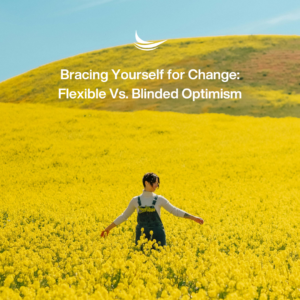Bracing Yourself for Change: Flexible Vs. Blinded Optimism
 In the book “Learned Optimism: How to Change Your Mind and Your Life” Martin E. P. Seligman Ph. D. writes “Learning optimism does not erode your sense of values or your judgment. Rather it frees you to use a tool to better achieve the goals you set”. We are not striving for blind optimism, but rather want to have flexible optimism.
In the book “Learned Optimism: How to Change Your Mind and Your Life” Martin E. P. Seligman Ph. D. writes “Learning optimism does not erode your sense of values or your judgment. Rather it frees you to use a tool to better achieve the goals you set”. We are not striving for blind optimism, but rather want to have flexible optimism.
I found these terms both interesting and timely to attitudes amid approaching change.
Think about a big upcoming change that involves transition, flexibility, and a positive attitude for a successful outcome.
Examples Include:
- Moving and adjusting to a new environment
- Changes in the structure of family dynamics due to separation, addition of partner(s), child(ren), or loss of family
- Workplace changes or transitions such as restructuring or implementation of new systems
An attitude check can help evaluate where you are at. Change is stressful, and there will be going to be challenges and these will be temporary; however, this is also an opportunity to utilize your strengths and access the internal and external resources that are available. When there is fear of the unknown and things may feel overwhelming, it can be easy to default to negativity. This may show up in worst-case scenario thinking and pessimism.
So… should I try to be positive and tell myself that everything will be fine? No, that is not going to be helpful either. A good balance is to practice flexible and realistic optimism for increasing resilience. Let’s take a closer look at flexible optimism and how this compares to blind optimism.
Flexible Optimism: A flexible optimism approach incorporates a hopeful and positive mindset, that is also realistic when considering the circumstances. There is a balance between realism and optimism.
The individual takes into consideration the facts of the situation which includes areas that are going to be more challenging but chooses to not get stuck in the negative. They can see both sides (problems and positive outcomes) and choose to remain hopeful.
They acknowledge the things that they can and cannot control. For example, an individual has control over how they think about situations and how they respond to feelings. They can choose to do the work that helps set them up for success. They can prepare to have resources available to lean on when things are difficult.
Blind Optimism: A blind approach to optimism says that things are going to work out, no matter what—being confident and positive of the outcome, without taking into consideration any challenges.
The individual may minimize the reality of the situation, due to confidence that things will work out as planned. They may deny the potential for problems and have difficulty coping due to inadequate plans in place to help support them. This type of person may find themselves in a stressful situation with a smile on their face, saying things are going to work out, without considering the emotional experiences they or others are facing.
In sum, a positive attitude is important for coping.
- Be realistic and choose flexible optimism.
- Acknowledge the facts of the situation and focus on things within your control.
- Utilize internal and external supports.
- Take into consideration the challenges but don’t fixate on the negative.
- Know that challenges will not last forever and keep in mind the goal you are working towards.
- Validate your feelings during challenging times, and the feelings of others who are struggling.
- Take care of yourself while experiencing stressful circumstances.



























